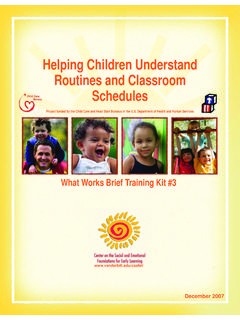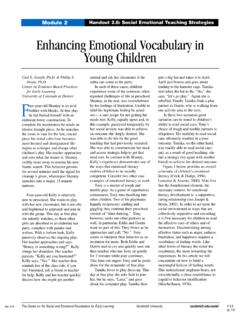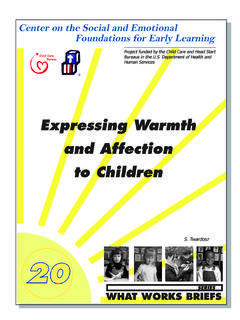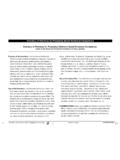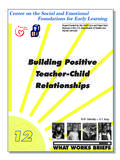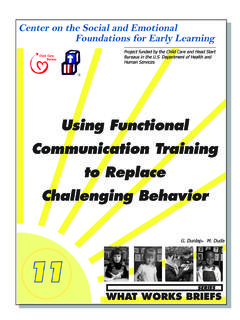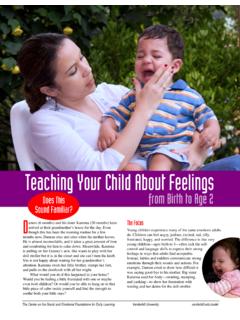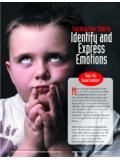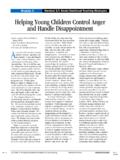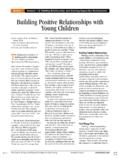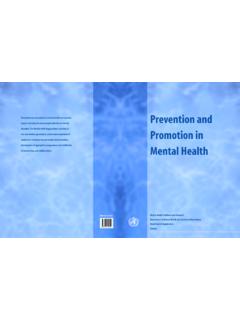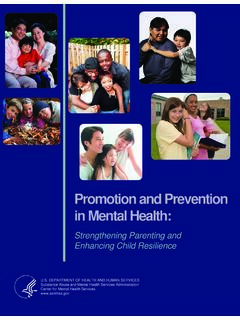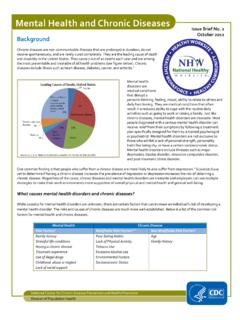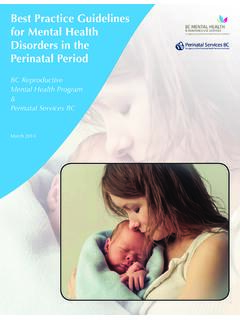Transcription of Research Synthesis Infant Mental Health and Early Care and ...
1 Research Synthesis Infant Mental Health and Early Care and Education Providers T. his Synthesis has been What is Infant Mental Health ? parents and other caregivers, infants developed to answer some of and toddlers learn what people Infant Mental Health (IMH) is the most frequently asked expect of them and what they can synonymous with healthy social and questions that Early childhood expect of other people. emotional development. The terms are providers have about Infant Mental The drive to explore and master used interchangeably throughout this Health (IMH) - Early social and one's environment is inborn in document. emotional development - and the IMH humans. Infants' and toddlers'. IMH is the developing capacity of system. It also provides information active participation in their own the child from birth to 3 to experience, about where to turn for additional learning and development is an regulate (manage), and express information for promoting IMH when important aspect of their Mental emotions; form close and secure children and families are experiencing Health .
2 Interpersonal relationships; and explore challenges. The Synthesis will address: The contexts of family and and master the environment and learn - The definition of IMH community are where infants and all in the context of family, community, Why it is important that Early toddlers learn to share and and cultural expectations for young childhood providers know about communicate their feelings and children. IMH experiences with significant Developing capacity is a reminder Approaches to promoting IMH caregivers and other children. A. of the extraordinarily rapid pace of prevention of IMH challenges developing sense of themselves as growth and change in the first 3. Focused intervention with children competent, effective, and valued years of life. and families at risk individuals is an important aspect of Infants and toddlers depend heavily More intense/tertiary interventions IMH. on adults to help them experience, regulate, and express emotions. Through close, secure interpersonal relationships with The Center on the Social and Emotional Child Care Office of Foundations for Early Learning Bureau Head Start Culture influences every aspect of used to describe a field of study and Early childhood care and human development, including how practice that has grown during the last education programs that include family IMH is understood, adults' goals three decades into a broad-based, support can be effective in the and expectations for young multidisciplinary, and international promotion of Infant Mental Health and children's development, and the effort to enhance the social and prevention of IMH challenges (Zeanah, child rearing practices used by emotional well-being of very young et al.)
3 2005). We know that infants and parents and caregivers (ZERO TO children (Heffron, 2000). toddlers experience typical THREE Infant Mental Health Task We know that infants and toddlers developmental challenges: separation Force, 2001). experience the full spectrum of social anxiety, stranger anxiety, autonomy emotional functioning ranging from issues, management of their emotions, development that seems to be on track toilet learning, peer conflict, and many Essentially, Infant Mental Health ( the ability to form satisfying more. While working with families, focuses on the optimal social and relationships with others, play, Early care and education providers emotional development of infants communicate, learn, and experience a make emotional and resource support and toddlers within the context of range of human emotions) to social available for the child and family to secure, stable relationships with emotional disorders Therefore, promote Infant and toddler well-being.
4 Caregivers (Zeanah & Zeanah, researchers from a wide variety of Early childhood programs such as 2001). disciplines have engaged in Research Early Head Start and child care in both and clinical study to build our centers and homes play an important knowledge about Infant development, role in the promotion of Infant Mental These caregivers include the caregiver- Infant relationships, and Health . In addition, home visiting child's birth parents, adoptive parents, environmental influences on children's programs and Health -related programs foster parents, grandparents, and child emotional development (Fitzgerald & such as Women, Infants, & Children care and education providers as well as Barton, 2000). The disciplines of child (WIC) and well-child visits can other significant adults who share the development, psychiatry, social work, emphasize the importance of 1). primary care and nurturance of infants psychology, Health , special education supporting the parent-child and toddlers (Weatherston & and others involved in assessing and relationship; 2) understanding typical Tableman, 2002).
5 IMH, then, has its treating young children, in both Mental child development and each child's roots in the understanding that Early Health and Health care settings, are core unique temperament; 3) learning development is the product of the disciplines in IMH. Early care and positive behavior support strategies;. Infant 's characteristics, caregiver- Infant education, Early intervention and child and 4) working to reduce family stress relationships, and the environment welfare play an important role as well. in order to help promote children's within which these relationships Each discipline has a unique Mental Health of children. unfold. All of these factors influence perspective through which it views an Infant 's Mental Health . infants and their development and each Focused Intervention - preventing the takes on both unique and overlapping occurrence or escalation of Mental roles in supporting social emotional Health problems and minimizing The term Infant Mental Health development (Zeanah & Zeanah, children's social emotional is also used to describe a field 2000).
6 Developmental risk (usually a family- of study and practice Another way for providers to think centered process). (Heffron, 2000) and a system about Infant Mental Health is to think of about the range of care, education, and Children and families may be at prevention of social and family support that are offered to very risk for experiencing challenges to emotional challenges young children (Zeanah, Stafford, their Mental Health (Sameroff, Bartko, promotion of social and Nagle, & Rice, 2005) depending on Baldwin, Baldwin & Seifer, 1998;. emotional Health , and how they seem to be getting along Sameroff & Fiese, 2000). Caregivers in treatment to support a (Zeanah, Stafford, & Zeanah, 2005). families may experience chronic return to social and The levels of care that we discuss in illness, homelessness, hospitalization, emotional Health (Zeanah, this paper are promotion and stress, a history of abuse, attachment Stafford, Nagle, & Rice, prevention , focused intervention, and challenges, short- and long-term 2005).
7 Tertiary (more intense services): depression, and psychological vulnerability (Conroy & Marks, 2003). promotion and prevention - Biological factors affecting the In addition to a focus on the encouraging good Mental Health and child such as prematurity, low birth child's social emotional development, social emotional wellness weight, disability, and difficulties in the term Infant Mental Health is also The Center on the Social and Emotional Foundations for Early Learning Vanderbilt University sensory processing and regulation - Why is it important for Early Why are nurturing and may also present obstacles to healthy emotional development. The childhood Providers to know responsive relationships so cumulative impact of multiple risk about Infant Mental Health ? critical for infants and toddlers? factors poses a potent threat to infants'. and families' Mental Health (Chazan- Early care and education programs A secure and responsive Cohen, Jerald, & Stark, 2001, p.)
8 7). have unique opportunities to relationship between the Infant or Zeanah et al. (2005) report on the promote Infant Mental Health . From toddler and his or her primary outcomes of a number of evidenced- the way teachers interact with caregivers is the foundation of based intervention programs. infants during feeding and Mental Health in the earliest years Focused intervention includes diapering to the way they engage and the context in which healthy providers collaborating with families to parents in the care of their child, social and emotional development assess and employ strategies to support Early care and education programs continues to flourish (Chazan- children with challenging behaviors. are continuously building and Cohen, Jerald, & Stark, 2001, p. 7). Early Head Start and Child Care nurturing relationships which programs may provide training to support the social emotional prepare Early care and education development of infants and their RELATIONSHIP EXPERIENCES IN THE Early .
9 Providers to offer these types of primary caregivers (Chazan-Cohen, YEARS LAY THE FOUNDATION FOR. programs. Other programs may employ Jerald, & Stark, 2001, p. 7) DEVELOPMENT. social workers or Mental Health The Early years of life lay the consultants to provide focused foundation for a child's lifelong intervention. Early childhood providers share development. From the time of with families the important conception to the first day of Intensive responsibility of promoting and kindergarten, development proceeds at Intervention/Treatment - More safeguarding the Early social a pace exceeding that of any intense services and supports to help emotional development of infants subsequent stage of life (National address Mental Health needs Early and and toddlers. Research Council and Institute of provide intensive services to support a The relationship between a child Medicine, 2000). It is during this time return to positive developmental and his/her family will have an that the brain undergoes its most progress (usually a family-centered impact for the remainder of that dramatic growth, and children acquire process) child's life.
10 The ability to think, speak, learn and Infants, toddlers, and their families Collaborating with families, reason. Early experiences, including may face very challenging supporting families, reducing family Early relationships, can and do circumstances and experience stress, and providing child influence the physical architecture of traumatic events child abuse, post development information through the brain, literally shaping the neural traumatic stress disorder, violence, home visits and family support connections in the Infant 's developing ongoing attachment challenges, programs will promote families' brain (National Scientific Council on depression, and Health problems - that understanding of the importance of the Developing Child, 2005). contribute to Mental Health concerns Early social emotional development. Research shows that supportive and that require more focused Supporting families will help to relationships have a tangible, long-term intervention with a Mental Health prevent child abuse and neglect, influence on children's healthy professional.
